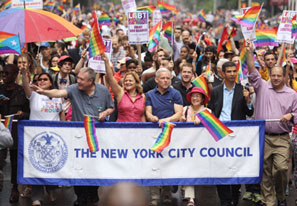
The news that six city council members are angling to give themselves a 71 percent raise will test even New Yorkers’ high tolerance for chutzpah. The pay proposal, if approved, would boost council member salaries from $112,500 to a staggering $192,500. The city’s 51-member council would become the highest-paid legislative body in the nation—including Congress—and council members would receive a higher base pay than any state governor.
Council speaker Melissa Mark-Viverito dismissed the suggestion that council members would receive such an extravagant raise, and said that she awaits the advice of a commission appointed to make recommendations about elected officials’ salaries. New York’s lawmakers haven’t received a raise since 2006, when their $90,000 salary was bumped up 22 percent, to its current level. (Mayor Michael Bloomberg opted not to convene the so-called Quadrennial Commission in 2010 because of the recession.) While a 71 percent raise sounds absurd, it’s likely intended as a highball opening bid so that any eventual increase—say, a mere 20 or 30 percent—will be seen as a reasonable compromise.
But the proposal has raised an important question: what do city council members do to justify the six-figure salaries they already enjoy? Their jobs, after all, are meant to be part-time. By law, the city council must meet twice each month, except during July and August. At these 20 “stated meetings,” votes are held and bills are introduced. After winning the speakership, Mark-Viverito promised to run the meetings efficiently, and indeed she starts them on time and typically adjourns them within 90 minutes or so. Almost every council member—except for the handful of Republicans and the speaker’s political enemies—gets assigned chairmanship of a committee, which usually meets once a month.
Council members serve on a number of these committees and are expected to attend committee hearings. They routinely show up just long enough to be marked “present” or to ask a question that could get them on the evening news. Each council member has a district office and a staff to deal with constituent services, media inquiries, and legislative matters. Council members keep themselves busy by attending events at senior centers or schools, meeting with local businesspeople, breakfasting with civic groups, and talking to other elected officials. To outsiders—whether employed in the public or private sector—it seems that council members make good money for doing what amounts to schmoozing for a living.
And the schmoozing comes with perks. Committee chairs are granted an additional “lulu” (payment in lieu of expenses) of $8,000 to compensate for time spent overseeing one committee hearing per month. The council’s majority leader, a position with no specific duties, gets a $15,000 lulu. The speaker gets an extra $25,000.
Advocates for the pay raise, in what they tout as a reformist measure, pledge to forego outside income and give up their lulus for the higher salaries. Earning outside income through a professional practice or a business, they suggest, is an inherently corrupting influence on the honorable execution of the “people’s business.” But the offer to go “full-time” in exchange for more money is just a bluff. Virtually no council members are capable of earning outside income, because few of them have any nongovernmental work experience. One-third of the 51 council members have zero significant prior work experience, except as aides to elected officials—frequently the council member whose seat they now occupy. Another six council members are former public school teachers. Several, including speaker Mark-Viverito, were union staffers or community organizers. Aside from a handful of lawyers who could possibly maintain private practices and an evangelical minister who continues to preach every Sunday, it’s hard to imagine that many members of the New York city council have much earning potential in the real world.
Council member Peter Koo, an immigrant from Hong Kong, is the exception. In 1971, Koo came to New York penniless. He worked his way through pharmacy school and now owns a successful chain of drugstores in Flushing. In a sad irony, if the council votes itself this raise and foregoes outside income, the only member of the body who actually employs people and generates revenue may have to step down.